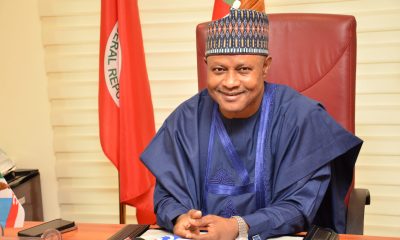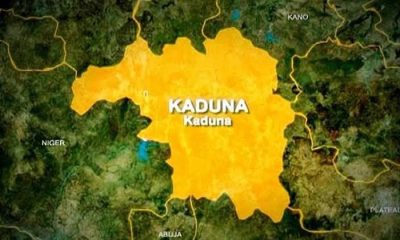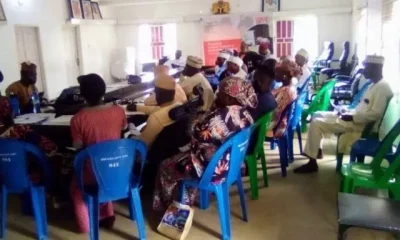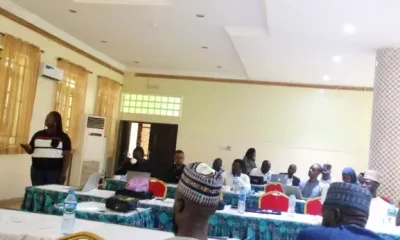News
Network restates committment to support Kaduna IRS on progressive tax regime
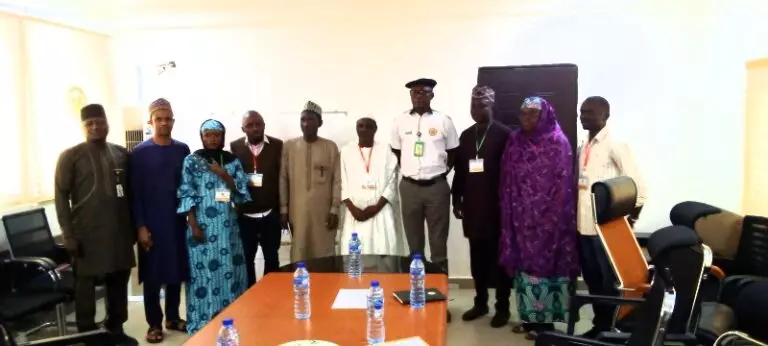
(Photo: 7th from L-R: Acting Executive Chairman of KADIRS, Mr Jerry Adams and the Coordinator of TJN Mr Simeon Olatunde in a group photograph with members of staff of KADIRS and TJN entourage on Thursday in Kaduna)
The Tax Justice Network (TJN) has restated its commitment to support the Kaduna State Internal Revenue Service (KADIRS) for fair, just, equitable and progressive tax regime in the state.
The TJN is an association of individuals and groups interested in engaging issues related to tax justice and promoting a fair, just, equitable and progressive tax regime in Nigeria.
It has a spread across the sub-national level.
Coordinator of the network in Kaduna, Mr Simeon Olatunde, made the committment at a familiarisation visit to the Acting Executive Chairman of KADIRS in Kaduna.
Olatunde noted that the association had, in the previous administrations, helped the KADIRS in publishing and distributing Hausa tax handbooks and rebuilt Lere grain market.
He added that the network also organised media engagements, trained the KADIRS staff on redress mechanisms among other engagements aimed at ensuring progressive tax regime.
He said that with support from Christian Aid, Partnership to Engage Reform and Learn, (PERL), Actionaid and OXFAM, among other funders, partners and supporters, they were able to carry out activities in line with the TJN objectives.
Olatunde therefore said the network was poised to increase domestic resource mobilisation to sustainably finance development.
He also said they were poised in campaigning for more fair and progressive tax policies in Kaduna to reduce multiple taxation, corporate tax dodging and other harmful tax practices in the state.
Olatunde, however, lamented that there wa huge capacity gap between the tax administrators at the local and state level and continued apathy of citizens on governance and taxes.
He also lamented that only few organisations were interested in tax justice, due to poor tax knowledge and weak synergy between TJN and KADIRS as well as other revenue generation agencies.
The coordinator called on the government to invest more in technology in a way that appealed to the
informal sector that would help capture it into the tax net.
He also urged the government to develop Kaduna tax policy/ implermentation framework to strengthen transparent and accountable service delivery.
It should also strengthen a feedback mechanism where taxpayers can track the update of some of the concerns raised through any of the communication paths.
“Kaduna State Internal Revenue Service should provide toll-free lines to ease the
cost of tax payments on taxpayers and
revive the Ease of Doing Business Committee in the state,” he said.
He commended the KADIRS for its recent arrest of six gang members of illegal tax collectors in the state.
Earlier, the Acting Executive Chairman of the KADIRS, Mr Jerry Adams, said they had done a lot in ensuring seamless tax administration in the state.
Regarding awareness creation and monitoring, he said they could not do it alone unless with the help of CSOs like the TJN and many others.
Adams noted that ordinarily, people did not like paying tax, adding that the attitude was not peculiar to Kaduna but the entire nation and developing countries in general.
He, therefore, said that for people to pay tax, they needed to know why they were paying it.
“When the people pay tax, they become stakeholders and ask questions on what the money is used for,” he said.
The acting executive chairman described the governor of the state, Sen. Uba Sani, as a wellfarist, stressing that his policies came with human face.
On that premise, he said they were trying on making the tax regime flexible to ensure that people complied voluntarily.
“In doing that, we need to create awareness as the people will know that there is a symbiotic relationship between them and the Government.
“When citizens pay tax, we give the government for them to use in development of the state.
“Paying tax by the people also attracts investment which will give birth to employment. The number of graduates our institutions are churning out is very high and government does not have the capacity to absorb them all.
“We want more private sector’s investment in the state, the government will not be able to meet up with its promises if people don’t pay tax,” Adams said.
Headline
Prince Harry visits sick Nigerian soldiers in Kaduna

Prince Harry and his team visited the 44 Nigerian Army Reference Hospital in Kaduna to interact with wounded soldiers who are receiving treatment.
The Duke of Sussex is in Nigeria with his wife to champion the Invictus Games, which Harry founded to aid the rehabilitation of wounded and sick servicemembers and veterans.
Nigeria joined the Invictus Community of Nations in 2022 becoming the first African country to join.
Prince Harry’s visit to Kaduna came 68 years after his late grandmother Queen Elizabeth II visited the state during the time of the late Premier of Northern Region Sir Ahmadu Bello.




News
Senate approves death penalty for drug traffickers
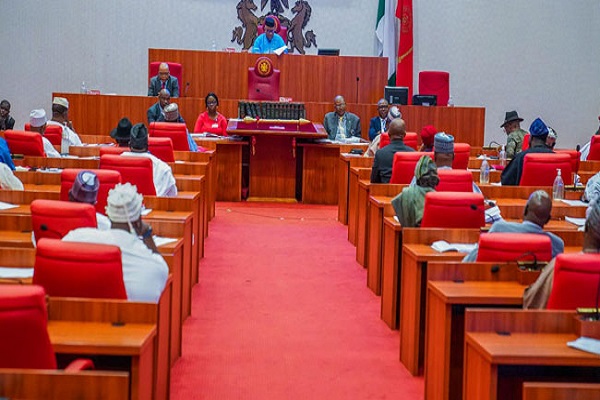
Senate on Thursday, May 9, approved the death penalty for those convicted on the charge of drug trafficking in the country.
The punishment prescribed in the extant NDLEA Act is a maximum sentence of life imprisonment.
The resolution of the Senate followed its consideration of a report of the Committees on Judiciary, Human Rights and Legal Matters and Drugs and Narcotics, National Drug Law Enforcement Agency (NDLEA) Act (Amendment) Bill, 2024.
The Chairman of the Committee on Judiciary, Human Rights & Legal Matters presented the report during plenary, Senator Mohammed Monguno (APC-Borno North).
The bill, which passed its third reading, aims to update the list of dangerous drugs, strengthen the operations of the NDLEA, review penalties, and empower the establishment of laboratories.
Section 11 of the current act prescribes that “any person who, without lawful authority; imports, manufactures, produces, processes, plants or grows the drugs popularly known as cocaine, LSD, heroin or any other similar drugs shall be guilty of an offence and liable on conviction to be sentenced to imprisonment for life” was amended to reflect a stiffer penalty of death.
Although the report did not recommend a death penalty for the offence, during consideration, Senator Ali Ndume moved that the life sentence should be upgraded to the death penalty.
During a clause-by-clause consideration of the Bill, Deputy Senate President Barau Jibrin, who presided over the session, put the amendment on the death penalty to a voice vote and ruled that the “ayes” had it.
But Senator Adams Oshiomhole objected to the ruling, saying that the “nays” had it.
He argued that matters of life and death should not be treated hurriedly, but Barau said it was too late, as he failed to call for division immediately after his ruling.
The bill was subsequently read for the third time and passed by the Senate.
-

 Headline5 days ago
Headline5 days agoSuspend cybersecurity levy– Reps to CBN
-

 Business5 days ago
Business5 days agoNigeria needs over $2bn to revive Ajaokuta Steel Plant, says Minister
-

 Headline3 days ago
Headline3 days agoPrince Harry visits sick Nigerian soldiers in Kaduna
-

 Entertainment3 days ago
Entertainment3 days agoAMVCA Cultural Day: BBNaija’s Neo, Venita win Best Dressed Male, Female
-

 Metro3 days ago
Metro3 days agoEx-Sports Minister laments after hospital neglected him for hours over N80000 deposit
-

 Headline5 days ago
Headline5 days agoTinubu resumes work after foreign trip
-

 News5 days ago
News5 days agoShan George’s money returned to Zenith Bank account



